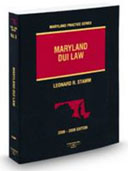Every year the Maryland legislature is bombarded by MADD, the Maryland State Police, and the States Attorneys, and are asked to strengthen Maryland’s DUI laws. Every year the DUI laws get strengthened, they never get made more lenient. This year they made a number of changes regarding ignition interlocks that raise some serious questions about how they will be implemented.
Prior to October 1, 2011, ignition interlock restrictions were primarily imposed where the driver submitted to a test with a result of .15 or higher, or refused, or had a second or subsequent test failure or refusal, or a second finding of guilt. After October 1, 2011 the new laws requires ignition interlocks as follows:
Mandatory Participation: A driver must participate in the program as a condition of modification of a license suspension or revocation of a license or the issuance of a restrictive license if the driver:
- is required to participate by a court order;
- is convicted of driving while under the influence of alcohol or under the influence of alcohol per se and had a blood alcohol concentration (BAC) at the time of testing of 0.15 or greater;
- is convicted of driving while under the influence of alcohol, under the influence of alcohol per se, or while impaired by alcohol and within the preceding five years was convicted of any specified alcohol and/or drug-related driving offense; or
- was younger than age 21 and violated the alcohol restriction imposed on the driver’s license or committed the specified alcohol-related driving offense.
These ignition interlock restrictions run for six months for a first ignition interlock restriction, for one year for a second ignition interlock restriction, and three years for a third or subsequent ignition interlock restriction. Failure to comply leads to a one year suspension of the license or privilege in Maryland, after which the driver must still comply with the program in order to get a drivers license. However after 45 days of the one year period the driver may be readmitted to the ignition interlock program.
Many drivers are unable to obtain an ignition interlock because they
live out of state or because they do not own a car. The new laws do not explain how the MVA is supposed to handle that situation. Additionally, drivers of commercial motor vehicles who need a commercial drivers license (CDL) may also be out of luck under the 2011 laws.
If you are facing serious criminal or traffic charges in Maryland call Leonard R. Stamm or Johanna Leshner of Goldstein & Stamm, P.A. at 301-345-0122 for a free consultation.
Leonard R. Stamm
Goldstein & Stamm, P.A.
6301 Ivy Lane, Suite 504
Greenbelt, Maryland 20770
www.lstamm.com
301-345-0122
(fax) 301-441-4652
Author: West’s Maryland DUI Law

 Maryland DUI Lawyer Blog
Maryland DUI Lawyer Blog

